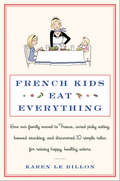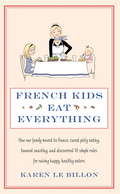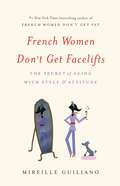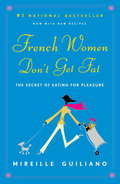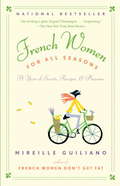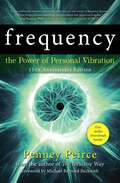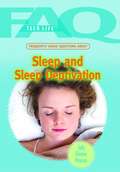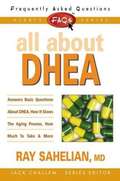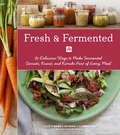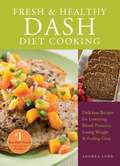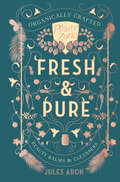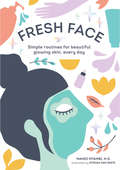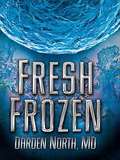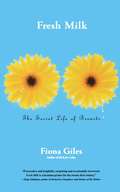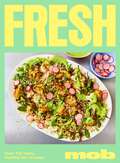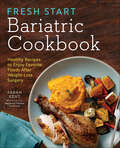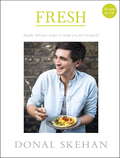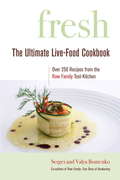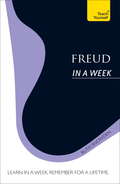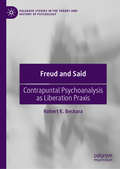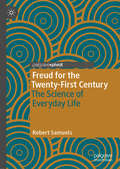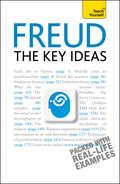- Table View
- List View
French Kids Eat Everything
by Karen Le BillonMoving her young family to her husband's hometown in northern France, Karen Le Billon is prepared for some cultural adjustment but is surprised by the food education she and her family (at first unwillingly) receive. In contrast to her daughters, French children feed themselves neatly and happily-eating everything from beets to broccoli, salad to spinach, mussels to muesli. The family's food habits soon come under scrutiny, as Karen is lectured for slipping her fussing toddler a snack-"a recipe for obesity!"-and forbidden from packing her older daughter a lunch in lieu of the elaborate school meal. The family soon begins to see the wisdom in the "food rules" that help the French foster healthy eating habits and good manners-from the rigid "no snacking" rule to commonsense food routines that we used to share but have somehow forgotten. Soon, the family cures picky eating and learns to love trying new foods. But the real challenge comes when they move back to North America-where their commitment to "eating French" is put to the test. The result is a family food revolution with surprising but happy results-which suggest we need to dramatically rethink the way we feed children, at home and at school.
French Kids Eat Everything: How our family moved to France, cured picky eating, banned snacking and discovered 10 simple rules for raising happy, healthy eaters
by Karen Le BillonFar too many parents face an ongoing struggle to get their kids to eat well, so why is it that French children gladly wolf down all the things our kids hate - the dreaded spinach or broccoli, fish, olives, salad...? In French Kids Eat Everything, Karen Le Billon shares her experience of moving to France and finding the inspiration to transform her family's approach to eating.If you've ever tried hiding healthy foods in your kids' meals, bribing them to finish - or even start - something healthy, or simply given up in exasperation at your child's extensive list of banned foods, this book will strike a chord. It charts the author's enlightening journey from stressed mum of picky eaters, to proud - if somewhat surprised - parent of healthy, happy eaters. Along the way, you'll discover the 'food rules' that help the French foster healthy eating habits, why it's vital to get kids to try the same food many times over, the value of educating your children about food from an early age, why how you eat is just as important as what you eat - and much, much more.With tips, tricks, rules and routines for happy, healthy eaters - plus some fast, tasty recipes to try - this isn't just another tale of Gallic gastronomic superiority but a practical guide to instilling in your kids healthy eating habits that will last them a lifetime (and ensure less stressful mealtimes for you too!).
French Women Don't Get Facelifts: The Secret of Aging with Style & Attitude
by Mireille GuilianoThe author of the bestselling French Women Don't Get Fat shares the secrets and strategies of aging with attitude, joy, and no surgery.With her signature blend of wit, no-nonsense advice, and storytelling flair, Mireille Guiliano returns with a delightful, encouraging take on beauty and aging for our times. For anyone who has ever spent the equivalent of a mortgage payment on anti-aging lotions or procedures, dressed inappropriate for their age, gained a little too much in the middle, or accidentally forgot how to flirt, here is a proactive way to stay looking and feeling great, without resorting to "the knife"-a French woman's most guarded beauty secrets revealed for the benefit of us all!
French Women Don't Get Fat
by Mireille GuilianoStylish, convincing, wise, funny–and just in time: the ultimatenon-diet book, which could radically change the way you think and live. French women don’t get fat, but they do eat bread and pastry, drink wine, and regularly enjoy three-course meals. In her delightful tale, Mireille Guiliano unlocks the simple secrets of this “French paradox”–how to enjoy food and stay slim and healthy. Hers is a charming, sensible, and powerfully life-affirming view of health and eating for our times. As a typically slender French girl, Mireille (Meer-ray) went to America as an exchange student and came back fat. That shock sent her into an adolescent tailspin, until her kindly family physician, “Dr. Miracle,” came to the rescue. Reintroducing her to classic principles of French gastronomy plus time-honored secrets of the local women, he helped her restore her shape and gave her a whole new understanding of food, drink, and life. The key? Not guilt or deprivation but learning to get the most from the things you most enjoy. Following her own version of this traditional wisdom, she has ever since relished a life of indulgence without bulge, satisfying yen without yo-yo on three meals a day. Now in simple but potent strategies and dozens of recipes you’d swear were fattening, Mireille reveals the ingredients for a lifetime of weight control–from the emergency weekend remedy of Magical Leek Soup to everyday tricks like fooling yourself into contentment and painless new physical exertions to save you from the StairMaster. Emphasizing the virtues of freshness, variety, balance, andalwayspleasure, Mireille shows how virtually anyone can learn to eat, drink, and move like a French woman. A natural raconteur, Mireille illustrates her philosophy through the experiences that have shaped her life–a six-year-old’s first taste of Champagne, treks in search of tiny blueberries (calledmyrtilles) in the woods near her grandmother’s house, a near-spiritual rendezvous with oysters at a seaside restaurant in Brittany, to name but a few. She also shows us other women discovering the wonders of “French in action,” drawing examples from dozens of friends and associates she has advised over the years to eat and drink smarter and more joyfully. Here are a culture’s most cherished and time-honored secrets recast for the twenty-first century. For anyone who has slipped out of her zone, missed the flight to South Beach, or accidentally let a carb pass her lips, here is a buoyant, positive way to stay trim. A life of wine, bread–even chocolate–without girth or guilt?Pourquoi pas?
French Women for All Seasons: A Year Of Secrets, Recipes, And Pleasure
by Mireille GuilianoFor the legions of fans who asked for seconds after devouring French Women Don't Get Fat, a charming and practical guide to adding some joie to your vie and to your table, every day of the year.By letter, by email and in person, readers of Mireille Guiliano's phenomenal bestseller French Women Don't Get Fat have inundated her with requests for more advice. Her answer: this buoyant new book, brimming with tips and tricks for living with the utmost pleasure and style, without gaining weight.More than a theory or ideal, the French woman's way is an all-encompassing program that can be practised anytime, anywhere. Here are four full seasons of strategies for shopping, cooking and moving throughout the year. Whether your aim is finding two scoopfuls of pleasure in one of crème brûlée, or entertaining beautifully when time is short and expectations are high, the answers are here. And here too are 100 new simple and appetizing recipes that feature French staples such as leeks and chocolate and many more unexpected treats besides, guaranteeing that boredom will never be a guest at your table.Woven through this year of living comme les françaises are more of Mireille's delectable stories about living in Paris and New York and travelling just about everywhere else - in the voice that has already beguiled a million honorary French women. Lest anyone still wonder: here is a new compendium of reasons - both traditional and modern - why French women don't get fat.From the Hardcover edition.
Frequency: The Power of Personal Vibration (Transformation Series)
by Penney PeirceA long-running classic, Frequency is a pioneering, award-winning, bestselling book on personal transformation and expanding consciousness. In this expanded 15th anniversary edition, readers are given a guide to mastering the world&’s rapidly accelerating energy and using it to improve the quality and flow of their lives.Every person, object, animal, and form as well as each sensation, emotion, thought, and state of being vibrates at a unique frequency. Your own personal vibration communicates who you are and helps shape your reality. Today the frequency of the planet is higher than it&’s ever been, and it continues to increase. Life is moving unbelievably fast, and our vibration, identity, and reality are continually adapting to keep pace—we&’re transforming! Now in this new, expanded 15th anniversary edition of Frequency, you can dive further into how the dynamics of frequency have evolved and how our consciousness has responded. With a fresh introduction and totally new chapter that describes important consciousness developments, bestselling author Penney Peirce brings high-frequency insights to reveal who we really are and how life can transform from difficulty to ease. You&’ll also find three new appendices to help facilitate this transformation and keep you inspired when life seems overwhelming. We&’re rapidly moving into a whole new &“state of being&” and sense of self. If you&’re open, the higher frequencies will shift your reality for the better and you&’ll remember how amazing you really are. Prepare to uplevel and adjust yourself to a new, exciting, and lit-up, high-vibration life with Frequency.
Frequently Asked Questions about Sleep and Sleep Deprivation
by Judy Monroe PetersonThe book describes the importance of sleep and its effects on the body, including common sleeping disorders, why some people do not get enough sleep, and medical aids for sleeping.
Frequently Asked Questions: All About DHEA
by Ray SahelianThis book is about the potential benefits and side effects of the hormone DHEA
Fresh & Fermented
by Charity Burggraaf Julie Hopper Richard J. Climenhage Julie O'BrienEating naturally fermented, probiotic foods (such as kimchi) is one of the healthiest and most effective ways to improve digestion. Balance the digestive system and boost your immunity with healthful, simple, and delicious everyday meals using Firefly Kitchens' recipes for fermented kimchi, krauts, and carrots. Making homemade fermented foods is simple and delicious. With eighty-five recipes like Kimchi Kick-Start Breakfast, Smoked Salmon Rueben, and Flank Steak over Spicy Noodles, Fresh & Fermented makes it easy to include these healthy foods in every meal.From the Trade Paperback edition.
Fresh & Healthy DASH Diet Cooking: 101 Delicious Recipes for Lowering Blood Pressure, Losing Weight and Feeling Great
by Andrea LynnDELECTABLE DASH DISHES FOR EVERY MEAL With its emphasis on fresh ingredients, low sodium, and portion control, DASH (Dietary Approaches to Stop Hypertension) is the best diet for a fit lifestyle. But cutting back on calories and salt doesn&’t have to mean sacrificing flavor. Fresh and Healthy DASH Diet Cooking makes following the DASH Diet easy and delicious, with recipes like: • Roasted Tomato Bruschetta • Lentil Salad with Mango • Skirt Steak Lettuce wraps • Jalapeño-Cilantro Chicken • Braised Chipotle Turkey • Blackened Catfish Tacos • Coconut Lemongrass Mussels • Rosemary Tomato Focaccia • Chocolate Pudding • Poached Pears with Lemon Yogurt Offering mouth-watering dishes, beautiful full-color photographs, and waistline-friendly tips, Fresh and Healthy DASH Diet Cooking is the ultimate guide to eating well and feeling great.
Fresh & Pure: Organically Crafted Beauty Balms And Cleansers (Pretty Zen #0)
by Jules Aron75 simple recipes for all-natural homemade beauty products Tired of wondering exactly what went into her beauty products, holistic health and wellness coach Jules Aron decided to make her own. Whipping up a luxurious face mask using little more than honey, apricots, and coconut oil, and an acne-fighting toner with cooling cucumber and antioxidant-rich green tea, she knew without a doubt that no preservatives or toxic chemicals were used. In Fresh & Pure, Aron explains how to use fruit, flowers, herbs, and minerals to craft healthy beauty products that promote radiant skin, strong nails, and shiny hair. With this helpful guide, readers will be able to pamper themselves from head to toe with aromatic, forward-thinking potions like charcoal soap, strawberry rose facial mist, pineapple sunflower body scrub, and aloe and avocado hair conditioner.
Fresh Face: Simple Routines for Beautiful Glowing Skin, Every Day
by Mandi Nyambi&“A crash course in the anatomy of a skincare routine . . . provides a holistic approach to better skin.&” —Forbes Fresh Face offers countless ideas, tips, and tricks for maintaining healthy, radiant skin. This lovely guide to skin care features more than thirty stress-free routines for every skin type and every life moment. Whether you&’re prepping for a big event, calming a breakout, traveling on a long flight, or indulging on a night in, Fresh Face has you covered: • Filled with tips for all kinds of skin types: dry, oily, combination, and aging • Advice on how to care for your skin from the inside out • Teeming with routines for a healthy and natural facial glow Fresh Face is a refreshing go-to skin care book for beauty enthusiasts who want to look and feel their best. With its emphasis on accessible skin care that will appeal to both the barefaced and the cosmetics-obsessed, this is a sweet and simple beauty bible for women of all ages. Great for those who adore all things beauty, DIY, and skin care, as well as readers of magazines like Glamour and Instyle. Featuring gorgeous illustrations and a die-cut cover, making it a deluxe gift for moms, daughters, sisters, and girlfriends, or as a self-buy Add it to the shelf with books like The Little Book of Skin Care: Korean Beauty Secrets for Healthy, Glowing Skin by Charlotte Cho, Skin Rules: Trade Secrets from a Top New York Dermatologist by Debra Jaliman, MD, and The Skincare Bible: Your No-Nonsense Guide to Great Skin by Anjali Mahto
Fresh Frozen
by Darden NorthIn this third medical thriller by award-winning author and practicing physician Darden North, human reproductive tissue becomes an unexpected commodity. In Fresh Frozen, a young policeman and his tormented wife fail miserably to produce a family, finding themselves outcasts of the renewed baby boom sweeping the United States. However, there is one last hope for them: a catalogue of human embryo and egg donors peddled by a woman whose standards are easily dismissed for the right price. Pursuing their futile attempts to become parents have nearly cost the wife her life and pushed the couple to the brink of bankruptcy. This seemingly last chance for Wesley and Carrie Sarbeck to satisfy their place as parents in Middle America unknowingly tosses them in the midst of a grisly murder, the world of Hollywood celebrities, and a heist of freshly frozen human embryos. The lives of Carrie Sarbeck and two other women intersect at the Van Deman Institute, once a decaying brick building complex just north of Jackson, Mississippi, but now a state-of-the-art center for the resolution of human infertility. While an internet voyeur and thief looks on, each of the three women, one of whom an internationally-known entertainer, has her own reason for entering the Institute. However, as a result of subjecting herself to a concoction of hormones and surgical procedures, one of the three is gruesomely murdered in an intriguing twist of human greed, mental torment, and medical science.
Fresh Fruit Cleanse: Detox, Lose Weight and Restore Your Health with Nature's Most Delicious Foods
by Leanne HallCLEANSE WHILE FEELING NOURISHED AND ENERGIZED Follow these delicious and hunger-satisfying all-fruit diets and you will lose weight and feel vibrantly healthy while clearing your body of toxins. Fresh Fruit Cleanse offers everything you need for an easy and powerful detox, including day-by-day programs, mouth-watering recipes, and advice for transitioning off the cleanse. •1 -DAY FRUIT BLAST Give your body a quick and powerful recharge to increase energy and boost your immune system •3 -DAY RESET CLEANSE Go longer to experience better skin and hair, a clearer mind, and a slimmer body •5 -DAY REBALANCE CLEANSE Recharge and realign your body as you release toxins while enjoying hearty all-fruit meals •7 -DAY DETOX DIET Enjoy a full nutrient-packed week of delicious fresh fruit for maximum results
Fresh Milk: The Secret Life of Breasts
by Fiona GilesWhile countless breastfeeding guides crowd bookshelves, not one of them speaks to women with anything approaching bestselling author Fiona Giles's level of intimacy and vitality. In Fresh Milk, through a provocative collection of stories, memories, and personal accounts, Giles uncovers the myths and truths of the lactating breast. From the young mother grappling with the bewildering trappings of maternity wear to the woman who finds herself surprisingly aroused by new sensations, and the modern dad who learns the ins and outs of breastfeeding, the portraits in Giles's eye-opening book offer a funny, wise, and comforting resource for women -- and even their friends and partners who have had, or expect, intimate experiences with the pleasures and pain of lactation. By turns poignant and informative, sexy and witty, empathic and empowering, Fresh Milk delivers everything we wanted to know about breastfeeding that our mothers never told us.
Fresh Mob: Over 100 tasty healthy-ish recipes
by MobThe freshest recipes from the team at Mob - Fresh Mob is packed with 100 of our favourite dishes that are tasty, filling and nourishing. Fresh Mob shares balanced meals that celebrate the textures and flavours that make food great - we're talking earthy Roast Aubergine and Squash Salad with Cheat's XO Dressing, a juicy Grilled Chicken Burger with Mojo Verde and Avo Salsa, the most comforting Cabbage Spaghetti Aglio e Olio and a range of healthy-ish puddings such as Carrot Sheet Cake with Tahini Cream Cheese Frosting. As always, we promise minimal and affordable ingredients and every recipe serves 4, so you can share with friends, save leftovers for the next day or scale recipes up or down to feed a few or to feed a crowd.Lots of veg, lots of protein, lots of nutrients, lots of food that will leave you feeling good and satisfied. These are recipes to make every day delicious.
Fresh Mob: Over 100 tasty healthy-ish recipes
by MobThe freshest recipes from the team at Mob - Fresh Mob is packed with 100 of our favourite dishes that are tasty, filling and nourishing. Fresh Mob shares balanced meals that celebrate the textures and flavours that make food great - we're talking earthy Roast Aubergine and Squash Salad with Cheat's XO Dressing, a juicy Grilled Chicken Burger with Mojo Verde and Avo Salsa, the most comforting Cabbage Spaghetti Aglio e Olio and a range of healthy-ish puddings such as Carrot Sheet Cake with Tahini Cream Cheese Frosting. As always, we promise minimal and affordable ingredients and every recipe serves 4, so you can share with friends, save leftovers for the next day or scale recipes up or down to feed a few or to feed a crowd.Lots of veg, lots of protein, lots of nutrients, lots of food that will leave you feeling good and satisfied. These are recipes to make every day delicious.
Fresh Start Bariatric Cookbook: Healthy Recipes to Enjoy Favorite Foods After Weight-Loss Surgery
by Sarah KentRediscover the pleasure of food after weight-loss surgeryWeight loss surgery doesn't have to mean giving up your favorite recipes for good. This up-to-date bariatric cookbook puts a surgery-safe twist on foods with 100+ healthy, comforting recipes that are simple enough to make every day, so you can sustain your long-term weight-loss and health goals.Learn how to implement the right portions, increase protein in your meals, and use the most nutritious ingredients, so your food is as good for you as it is delicious. With nutritional information for every recipe, keeping track of your fluid and calorie intake is easy.The Fresh Start Bariatric Cookbook is a new nutrition plan for your new body, featuring:Options for every stage—Each recipe is marked with an icon that tells you which stage of post-operation it's appropriate for: full liquid, puree, soft foods, or general diet.Flavorful recipes—Enjoy comfort foods like Chocolate-Peanut Butter Smoothies, Turkey Breakfast Burritos, Baked Salmon with Barbecue Seasoning, Low-Carb Cheeseburger Casserole, and much more.Foods for every body—These dishes are crafted to meet your needs after gastric sleeve surgery (or vertical sleeve gastrectomy), laparoscopic adjustable gastric band placement, and more.Enjoy some of your favorite foods while staying on the path to better health and weight loss with this bariatric cookbook.
Fresh: Simple, delicious recipes to make you feel energised
by Donal SkehanSimple, delicious, healthy recipes from Irish TV and Saturday Kitchen host Donal Skehan"I aim for balanced eating, which allows me to enjoy the food I've always loved but also puts a focus on including as much seasonal fresh fruit and vegetables, grains and smaller amounts of high-quality meats in my diet. I take my time to cook and I take my time to eat. These 'rules' allow me to stay true to what I believe good home cooking to be - at its heart, this is a book of healthy, fresh recipes that are as nourishing as they are delicious."DONAL SKEHANFRESH is jam-packed with yummy recipes to cook at home and fill you with energy. Don't deprive yourself - it's all about maximising your health through eating delicious and nutrient-packed food.Tying into Donal's TV series on eating for energy, FRESH includes recipes for breakfasts and snacks as well as Food On The Run, Quick Cook Suppers, and Better For You Dessert & Sweet Treats, such as Peanut Butter Brownies, Mega Beetroot Burgers, Mini Quinoa, Pea and Courgette Cakes, Gluten-free Pancakes with Blueberry, Banana and Honey - big on flavour and chock-full of goodness!
Fresh: The Ultimate Live-Food Cookbook
by Valya Boutenko Sergei BoutenkoCookbooks need not--indeed, should not--involve cooking, say the authors of this authoritative, beautifully illustrated book. And they should know. Sergei and Vayla Boutenko bring fifteen years' experience to this collection of scrumptious, sophisticated recipes and comprehensive guide to the raw life. Fresh covers the whole range of recipes, including savory dishes, desserts, fermented foods, drinks, and wild foods. Techniques common to the recipes are introduced and clearly explained, including an inventory of uncommon fruits and how to handle and prepare them, as well as an immersion into the five basic flavors and the herbs, fruits, vegetables, and grains that help chefs bring out each flavor best. The authors introduce the three stages of adaptation to this lifestyle and provide a concise review of minimal equipment requirements and ideal appliance additions for the well-stocked raw kitchen.
Freud In A Week: Teach Yourself
by Ruth SnowdenLearn in a week, remember for a lifetime!In just one week, this accessible book will give you knowledge to last forever. End of chapter summaries and multiple choice questions are all designed to help you test your knowledge and gain confidence. So whether you are a student or you simply want to widen your knowledge, you will find this seven-day course a very memorable introduction.Sunday: Learn who Freud was and what he didMonday: Explore Freud's early work and the beginnings of his psychoanalytical ideasTuesday: Discover Freud's views on the interpretation of deams and on the importance of the unconsciousWednesday: Consider Freud's often-controversial sexual theoriesThursday: Understand Freud's views on the importance of childhood, and how adult identity is formedFriday: Learn about Freud's views on civilization, religion and societySaturday: Look at how psychoanalysis has developed since Freud's time and how it is used today.
Freud In A Week: Teach Yourself
by Ruth SnowdenLearn in a week, remember for a lifetime!In just one week, this accessible book will give you knowledge to last forever. End of chapter summaries and multiple choice questions are all designed to help you test your knowledge and gain confidence. So whether you are a student or you simply want to widen your knowledge, you will find this seven-day course a very memorable introduction.Sunday: Learn who Freud was and what he didMonday: Explore Freud's early work and the beginnings of his psychoanalytical ideasTuesday: Discover Freud's views on the interpretation of deams and on the importance of the unconsciousWednesday: Consider Freud's often-controversial sexual theoriesThursday: Understand Freud's views on the importance of childhood, and how adult identity is formedFriday: Learn about Freud's views on civilization, religion and societySaturday: Look at how psychoanalysis has developed since Freud's time and how it is used today.
Freud and Said: Contrapuntal Psychoanalysis as Liberation Praxis (Palgrave Studies in the Theory and History of Psychology)
by Robert K. BesharaThis book examines the theoretical links between Edward W. Said and Sigmund Freud as well the relationship between psychoanalysis, postcolonialism and decoloniality more broadly. The author begins by offering a comprehensive review of the literature on psychoanalysis and postcolonialism, which is contextualized within the apparatus of racialized capitalism. In the close analysis of the interconnections between the Freud and Said that follows, there is an attempt to decolonize the former and psychoanalyze the latter. He argues that decolonizing Freud does not mean canceling him; rather, he employs Freud’s sharpest insights for our time, by extending his critique of modernity to coloniality. It is also advanced that psychoanalyzing Said does not mean psychologizing the man; instead the book's aim is to demonstrate the influence of psychoanalysis on Said’s work. It is asserted that Said began with Freud, repressed him, and then Freud returned. Reading Freud and Said side by side allows for the theorization of what the author calls contrapuntal psychoanalysis as liberation praxis, which is discussed in-depth in the final chapters.This book, which builds on the author’s previous work, Decolonial Psychoanalysis, will be a valuable text to scholars and students from across the psychology discipline with an interest in Freud, Said and the broader relationship between psychoanalysis and colonialism.
Freud for the Twenty-First Century: The Science of Everyday Life
by Robert SamuelsThis book places Freud’s theory of the reality principle in relation to both everyday experience and global issues of the 21st century and illustrates how it may be practically applied. Arguing against more critical recent accounts of Freud’s science, the author seeks to show how one might apply the scientific method to everyday life. It demonstrates how Freud contributes to a better understanding of reason and how this in turn can be used to unravel the role of unreason in both politics and personal relationships. Including critical examinations of topics such as Narcissism, Victimhood and Empathy, this engaging reappraisal of Freud’s relevance to contemporary life offers fresh insights for psychology, psychoanalysis and cultural theory; as well as practical guidance for a general reader.
Freud: Psychoanalysis, dreams, the unconscious and more
by Ruth SnowdenReading the complete works of Sigmund Freud would take more time than most of us have to spare. Freud - the Key Ideas condenses all the information you need about the life and work of the great man into one book. With clear explanations and examples drawn from Freud's own cases you will soon have a solid understanding of the main concepts, from psychosexual development to dream analysis.NOT GOT MUCH TIME?One, five and ten-minute introductions to key principles to get you started.AUTHOR INSIGHTSLots of instant help with common problems and quick tips for success, based on the author's many years of experience.TEST YOURSELFTests in the book and online to keep track of your progress.EXTEND YOUR KNOWLEDGEExtra online articles at www.teachyourself.com to give you a richer understanding of Freud.FIVE THINGS TO REMEMBERQuick refreshers to help you remember the key facts.TRY THISInnovative exercises illustrate what you've learnt and how to use it.
